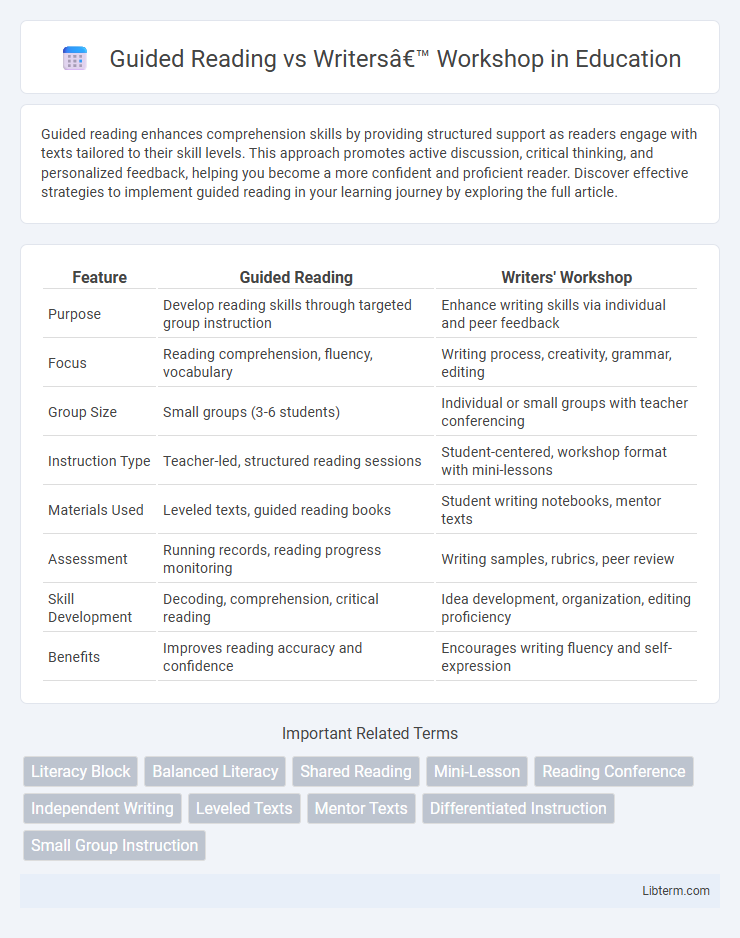Guided reading enhances comprehension skills by providing structured support as readers engage with texts tailored to their skill levels. This approach promotes active discussion, critical thinking, and personalized feedback, helping you become a more confident and proficient reader. Discover effective strategies to implement guided reading in your learning journey by exploring the full article.
Table of Comparison
| Feature | Guided Reading | Writers' Workshop |
|---|---|---|
| Purpose | Develop reading skills through targeted group instruction | Enhance writing skills via individual and peer feedback |
| Focus | Reading comprehension, fluency, vocabulary | Writing process, creativity, grammar, editing |
| Group Size | Small groups (3-6 students) | Individual or small groups with teacher conferencing |
| Instruction Type | Teacher-led, structured reading sessions | Student-centered, workshop format with mini-lessons |
| Materials Used | Leveled texts, guided reading books | Student writing notebooks, mentor texts |
| Assessment | Running records, reading progress monitoring | Writing samples, rubrics, peer review |
| Skill Development | Decoding, comprehension, critical reading | Idea development, organization, editing proficiency |
| Benefits | Improves reading accuracy and confidence | Encourages writing fluency and self-expression |
Understanding Guided Reading: Purpose and Benefits
Guided Reading is an instructional approach designed to support students in developing reading proficiency through targeted, small-group sessions tailored to their specific skill levels. The purpose of Guided Reading is to provide differentiated instruction that fosters decoding, fluency, and comprehension strategies, enabling students to engage with texts at an appropriate challenge level. Benefits include personalized feedback, increased confidence in reading, and the gradual release of responsibility as learners become more independent readers.
What Is Writers’ Workshop? Key Components
Writers' Workshop is an instructional approach that emphasizes student-centered writing development through mini-lessons, independent writing time, and personalized feedback. Key components include explicit teaching of writing strategies, opportunities for drafting and revising, and regular sharing sessions where students present their work and receive peer or teacher feedback. This framework fosters creativity, critical thinking, and gradual skill improvement within authentic writing experiences.
Comparing Instructional Approaches
Guided Reading emphasizes small group instruction tailored to students' reading levels, promoting decoding, fluency, and comprehension skills through targeted text analysis. Writers' Workshop centers on developing writing skills by encouraging student choice, process writing, and peer feedback within a structured routine. Comparing these instructional approaches highlights Guided Reading's focus on reading mechanics and comprehension, while Writers' Workshop fosters creativity, organization, and reflection in writing development.
Student Engagement in Guided Reading vs Writers’ Workshop
Guided Reading fosters student engagement by providing targeted support through small group interactions and leveled texts tailored to reading proficiency, enhancing comprehension and fluency. Writers' Workshop promotes active participation by allowing students to explore personal voice and creativity while receiving individualized feedback during the writing process. Both approaches increase engagement by addressing specific literacy skills, but Guided Reading emphasizes reading skills development, whereas Writers' Workshop centers on writing expression and revision.
Differentiation and Individualized Learning
Guided Reading offers targeted support by grouping students based on reading levels, allowing teachers to tailor instruction and materials to specific literacy needs for effective skill development. Writers' Workshop emphasizes individualized writing conferences, enabling personalized feedback and goal-setting that cater to each student's unique writing progress and challenges. Both approaches prioritize differentiation but apply it through structured group dynamics in guided reading and personalized one-on-one interactions in writers' workshop.
Role of the Teacher: Facilitator or Instructor?
In Guided Reading, the teacher acts primarily as an instructor, providing targeted support and scaffolding to develop students' decoding and comprehension skills through carefully selected texts. In contrast, Writers' Workshop positions the teacher as a facilitator, encouraging student autonomy by guiding individual writing processes, offering feedback, and fostering a collaborative environment. This distinction highlights how Guided Reading emphasizes direct instruction, while Writers' Workshop centers on personalized mentorship and creative exploration.
Assessing Progress: Methods and Tools
Guided Reading employs running records and leveled text analysis to assess student reading progress through observation of decoding and comprehension skills. Writers' Workshop utilizes portfolio assessments and writing conferences to monitor growth in writing fluency, organization, and grammar proficiency. Both methods incorporate formative assessment tools tailored to individual student needs for targeted instructional support.
Integrating Guided Reading and Writers’ Workshop
Integrating Guided Reading and Writers' Workshop enhances literacy instruction by creating stronger connections between reading comprehension and writing skills, allowing students to apply text analysis directly to their writing. Small-group guided reading sessions differentiate instruction tailored to students' reading levels, while Writers' Workshop provides flexible, student-centered writing practice, fostering creativity and critical thinking. Combining these approaches maximizes literacy development by reinforcing comprehension strategies and writing processes in a cohesive learning environment.
Challenges and Solutions in Implementation
Implementing Guided Reading faces challenges such as differentiating instruction for diverse student levels and managing small groups effectively, which can be addressed by formative assessments and strategic group rotations. Writers' Workshop encounters difficulties in fostering student independence and providing personalized feedback, resolved through scaffolded mini-lessons and incorporating peer review sessions. Both approaches benefit from ongoing teacher training and flexible scheduling to enhance engagement and maximize instructional impact.
Choosing the Right Approach for Your Classroom
Guided Reading emphasizes small-group instruction targeting specific reading skills, ideal for differentiated literacy development and assessing student progress in real-time. Writers' Workshop fosters a student-centered writing process, promoting creativity and independent writing through mini-lessons, peer collaboration, and individualized feedback. Selecting the right approach depends on classroom goals: Guided Reading suits structured reading skill acquisition, while Writers' Workshop best supports developing confident, autonomous writers.
Guided Reading Infographic

 libterm.com
libterm.com